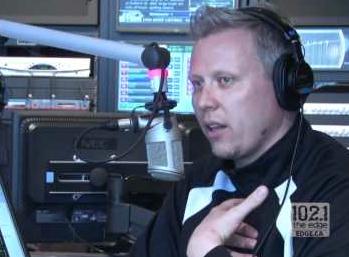In March 2011, NBA star Kobe Bryant cursed out a referee for what he felt was a stupid call. By itself, this behaviour is unexceptional. But Bryant had chosen to ridicule the referee’s judgment by calling him a “fucking faggot,” and the response was severe. The Lakers shooting guard was fined $100,000 – an extraordinary sum for player discipline. Bryant also publicly apologized for his ill-considered and offensive language.
A recent ruling by the Canadian Broadcast Standards Council, the industry’s self-regulatory body, took a different approach.
The CBSC received a complaint following an October 2011 broadcast of The Dean Blundell Show on Toronto’s Edge 102.1FM. The show mocked the idea of “Jesusween,” a Christian alternative to Halloween, which Blundell called “very gay.” The show then used an extended riff to mock “Jesus freakos,” including a bit that played on the suffix “ween” and suggested Jesus and the 12 apostles were gay, complete with fey voices and gay stereotypes.
The CBSC ruled on May 24 that The Dean Blundell Show had violated its standards, but only due to the offensive religious content, not because the station had used the word gay to imply something was stupid.
“The panel concluded that the word ‘gay’ has a variety of meanings, among others ‘stupid’ or ‘weak,'” states the CBSC report. “[Given the context] it did not constitute, in and of itself, a negative portrayal of an individual or a group based on sexual orientation.”
Essentially, explicitly mocking religion violates the standards but using language that implicitly mocks gay individuals as stupid or weak is not strong enough to be a violation.
CBSC executive director John McNab stresses that in any given judgment context is paramount: “Clearly [gay] can clearly be used in a negative connotation. In this instance it wasn’t related to sexual orientation at all; it was just ‘That’s a stupid name.'”
Professor Scott Rayter, the associate director of Sexual Diversity Studies at the University of Toronto, finds the language offensive but cautions against thinking that censorship will solve the problem. “This guy could have said much more offensive things about gay people without violating any standards . . . I mean, just turn on CFRB and listen to Michael Coren.”
He adds that censorship laws cut both ways, and gay people have historically been among the first to be targeted.
Blundell equally offends many different groups and individuals. His show has been the source of the most complaints reviewed by the CBSC in 2012. He previously aired a 15-minute comedy segment stereotyping the participants in Canada’s first gay fraternity (and mocking frats more generally), derisively called Justin Bieber gay and has a periodic segment called “gay of the day.”
There have also been complaints that Blundell’s show is demeaning to women, offensive to ethnic groups and uses graphic language inappropriate for its morning time slot.
The CBSC ruling is similar to a 2006 decision at the BBC. A host had referred to a ringtone as “gay,” and the panel ruled that since this was the linguistic equivalent to “rubbish,” and not used to undermine any person or group, it was acceptable.
It’s language that Bob Willette, program director of Toronto’s 103.9 Proud FM, says his station avoids unless referring to someone’s sexuality. In fact, the station’s employees were split when deciding whether or not to broadcast Katy Perry’s song “Ur So Gay.”
“Language can be hurtful, language can be powerful, language can be inspirational. When it’s used in a way that is hurtful, people need to be taken to task for that,” Willette says.
Like Rayter, Willette opposes censorship and doesn’t think public shaming works in the case of a shock jock like Blundell, who “thrives on it.” According to Willette, the difficult road of public education is the path to follow.
Recent efforts have been made to change the mindset of people who use language like “that’s so gay,” including the US educational campaign Think Before You Speak. Featuring celebrities Wanda Sykes, Hilary Duff and Whoopi Goldberg, the series of PSAs created in 2008 encouraged young people to think about how language frames individuals and how to change bad habits.
In 2010, US clothing company American Apparel tried a different approach. Its effort focused on reclaiming the language by selling T-shirts (all profits went to charity) with the slogan “Marriage is so gay.”
If the reaction to Bryant’s use of “faggot” is any indication, then these efforts to shape language in a positive direction may mark slow but incremental progress. After all, if the macho world of the NBA can acknowledge problematic language, there’s hope for the likes of talk radio, too. Even if language can’t be controlled, then it can be informed by social norms shaped by the wider public.
Or, as McNab says, while Blundell’s comment may not have violated the broadcast standards, “It’s certainly not language I would personally use.”

 Why you can trust Xtra
Why you can trust Xtra


